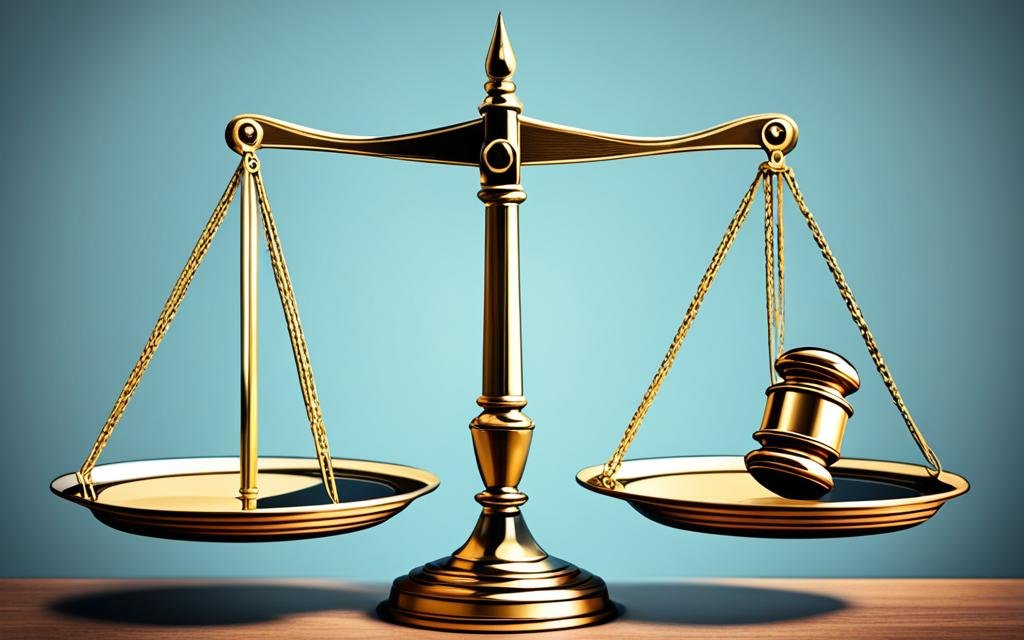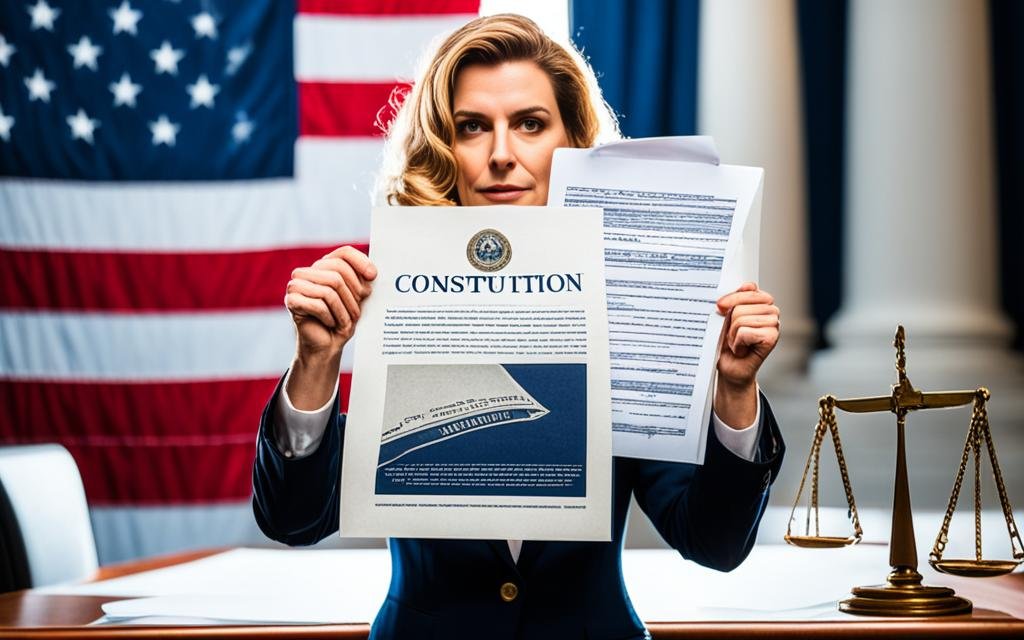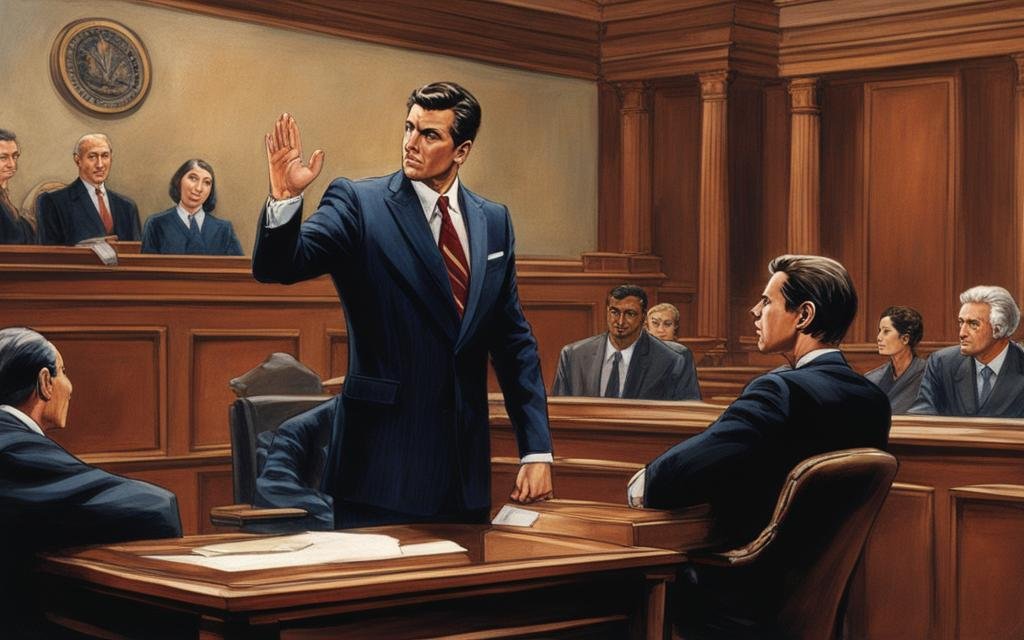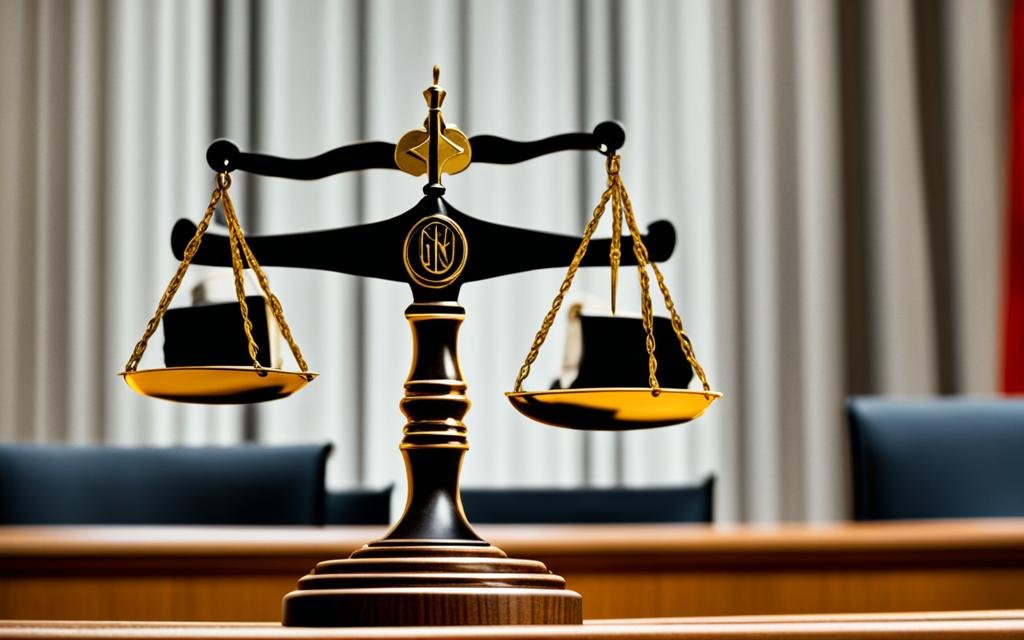Welcome to our comprehensive guide on understanding your legal rights during criminal case trials. Whether you are facing charges or simply interested in learning more about the process, this citizen’s guide will provide crucial insights into the constitutional protections you are entitled to. By understanding your rights, you can navigate the criminal case trial process with confidence and ensure that your legal rights are upheld.
In this guide, we will delve into the fundamental constitutional protections that every defendant has the right to, as well as provide a step-by-step explanation of the criminal case trial process. From the initial arrest to the final verdict, we will cover the key aspects of the legal journey, empowering you with the knowledge to make informed decisions and effectively exercise your legal rights.
Key Takeaways:
- Understanding your legal rights is essential during criminal case trials.
- Constitutional protections ensure that defendants are treated fairly throughout the legal process.
- Having knowledge of the criminal case trial process empowers you to make informed decisions.
- Exercising your legal rights with confidence is crucial for a fair and just trial.
- Continual education on legal matters is important to stay informed and protect your rights.
Your Legal Rights in Criminal Cases
When facing criminal charges, it is essential to understand your legal rights and protections. These rights are enshrined in the U.S. Constitution and its amendments, with the Bill of Rights serving as the cornerstone for defendant’s rights. Additionally, these rights have been incorporated into state law to ensure consistency and protection across the nation.
The Structure of the Constitution and Amendments
The U.S. Constitution is the supreme law of the land, providing the framework for the country’s legal system. It consists of seven articles that outline the structure of the government and its powers. To date, there have been 27 constitutional amendments, which address various issues and expand individual rights.
The Bill of Rights as the Cornerstone for Defendant’s Rights
The Bill of Rights, comprising the first ten amendments to the Constitution, guarantees essential rights and protections in criminal cases. These rights include the right to a fair trial, protection against unreasonable searches and seizures, the right to remain silent, and more. The Bill of Rights ensures that individuals accused of crimes are treated fairly and have their rights upheld throughout the legal process.
The Incorporation of the Bill of Rights into State Law
The incorporation of the Bill of Rights into state law means that these rights are applicable at both the federal and state levels. This ensures that defendants’ rights are protected not only in federal court but also in state courts. The incorporation of these rights into state law reaffirms the importance of safeguarding individual liberties and ensures that defendants are afforded the same fundamental rights, regardless of jurisdiction.
In summary, understanding your legal rights in criminal cases is crucial for navigating the justice system effectively. The U.S. Constitution, constitutional amendments, and the Bill of Rights establish these rights, which have been incorporated into state law to provide consistent protection. By being aware of your rights, you can actively participate in your defense and ensure a fair and just legal process.
Understanding the Criminal Defense Rights
In the criminal justice system, defendants have certain rights that are crucial to a fair and just trial. This section will provide an overview of these important rights and their significance in ensuring a proper defense.
The Right to Counsel: Gideon v. Wainwright
One of the most fundamental rights in criminal defense is the right to counsel, guaranteed by the landmark Supreme Court case Gideon v. Wainwright. This decision established that individuals facing criminal charges have the right to legal representation, regardless of their ability to afford an attorney. The right to counsel ensures that defendants have competent legal advice and guidance throughout the trial process.
To emphasize the importance of this right, it is essential to be aware of the expertise an attorney brings. From providing legal advice and building a strong defense strategy to navigating complex legal procedures, having competent legal representation can significantly impact the outcome of a case.
The Right to a Public and Speedy Trial
Another crucial right in criminal defense is the right to a public and speedy trial. The public trial aspect ensures transparency and accountability in the justice system, allowing the public to witness the proceedings and ensuring fairness and impartiality.
Additionally, the right to a speedy trial protects defendants from undue delays in the legal process. This right ensures that individuals are not subject to prolonged incarceration or excessive pretrial detention, allowing for a timely resolution of the case.
The Right to an Impartial Jury and the Voir Dire Process
An impartial jury is a cornerstone of a fair trial. Defendants have the right to have their case heard by a jury that is free from bias or prejudice. The voir dire process, during which potential jurors are questioned and evaluated, plays a crucial role in selecting an unbiased jury.
The voir dire process allows attorneys to assess potential jurors’ suitability and impartiality based on their understanding of the case, personal biases, or any other factors that could influence their judgment. This process ensures that defendants have a fair chance to present their case to an unbiased jury.

Navigating the Criminal Court Process Rights
In order to navigate the criminal court process effectively, it is essential to have a clear understanding of the rights and procedures involved. By being aware of your rights at each stage, you can ensure that your case is handled fairly and that you are afforded the protections you are entitled to.
The criminal court process can be complex, but by familiarizing yourself with the various stages, you can better navigate the system. The following is a breakdown of the different stages and the corresponding rights that defendants have:
- Arrest: When you are arrested, you have the right to remain silent and the right to an attorney. It is crucial to exercise these rights and refrain from making any self-incriminating statements. An attorney will be able to guide you through the process and protect your interests.
- Booking: After being arrested, you will be booked into the system. During this stage, you have the right to be treated humanely and have any necessary medical attention provided to you.
- Arraignment: At the arraignment, the charges against you will be formally presented, and you will have the opportunity to enter a plea. You have the right to understand the charges against you and have them explained if necessary. It is important to consult with your attorney before entering a plea.
- Pretrial: During the pretrial stage, your attorney may negotiate a plea bargain on your behalf, or your case may proceed to trial. You have the right to challenge any evidence presented against you and have witnesses testify on your behalf.
- Trial: If your case goes to trial, you have the right to a fair and impartial jury. You also have the right to confront witnesses against you and present evidence in your defense. Your attorney will play a crucial role in advocating for your rights throughout the trial.
- Sentencing: If you are found guilty, you have the right to be sentenced in a fair and just manner. This includes the right to have any relevant factors considered in determining your sentence.
- Appeals: If you are convicted, you have the right to appeal the decision. An appellate court will review your case to ensure that legal errors were not made during the trial.
By understanding and asserting your rights at each stage of the criminal court process, you can navigate the system with confidence and ensure that your rights are protected. Remember to consult with an experienced criminal defense attorney who can provide guidance and advocate for you throughout the process.
Rights of the Accused from Arrest to Trial
When an individual is accused of a crime, they have certain rights that are protected under the law. From the moment of arrest to the trial, these rights ensure that defendants are treated fairly and have an opportunity to defend themselves. This section will focus on three key rights that are crucial during the criminal justice process: Miranda rights and police investigations, search warrants and the Fourth Amendment protections, and the right to remain silent and the right to an attorney.
Miranda Rights and Police Investigations
Upon arrest, individuals are read their Miranda rights, which include the right to remain silent and the right to an attorney. These rights, established by the Supreme Court in Miranda v. Arizona, protect the accused from self-incrimination during police interrogations. It is important for defendants to understand that they do not have to answer any questions posed by law enforcement and that they have the right to request legal representation before making any statements.
Search Warrants and the Fourth Amendment Protections
The Fourth Amendment of the U.S. Constitution protects individuals from unreasonable searches and seizures. In order to conduct a search of a person’s property, including their home or possessions, law enforcement must obtain a search warrant, which requires probable cause. Search warrants ensure that investigations are conducted within the bounds of the law and help protect individuals from unwarranted intrusions into their privacy.
Invoking Your Right to Remain Silent and the Right to an Attorney
Defendants have the right to remain silent during their interactions with law enforcement. This means that they can choose not to answer questions or provide any self-incriminating information. By invoking their right to remain silent, individuals can help safeguard themselves against potentially harmful statements that could be used against them in court.
Additionally, defendants have the right to an attorney throughout the entire legal process. If a defendant cannot afford an attorney, one will be provided for them. Having legal representation is essential to ensure that defendants understand their rights, can navigate the complexities of the legal system, and can mount an effective defense.
Constitutional Rights in Criminal Cases
In criminal cases, individuals have certain constitutional rights that are essential for ensuring a fair and just legal process. Two key amendments in the United States Constitution, the Sixth Amendment and the Fifth Amendment, provide crucial protections to defendants.
The Confrontation Clause in the Sixth Amendment
The Sixth Amendment guarantees the right to confront one’s accuser. Known as the Confrontation Clause, this critical provision ensures that defendants have the opportunity to cross-examine witnesses who testify against them. This confrontational right helps to ensure the reliability and credibility of evidence presented in criminal trials.
The Protection Against Self-Incrimination in the Fifth Amendment
The Fifth Amendment provides individuals with protection against self-incrimination. This means that defendants cannot be forced to testify and provide evidence against themselves. The right to remain silent, often associated with the Miranda rights, is an essential component of this protection. It allows individuals to avoid making potentially incriminating statements that could be used against them in a criminal case.
Double Jeopardy: Prohibition Against Multiple Trials for the Same Offense
Another significant constitutional right in criminal cases is the prohibition against multiple trials for the same offense, commonly known as double jeopardy. This protection, derived from the Fifth Amendment, ensures that individuals cannot be tried twice for the same crime. Once a person has been acquitted or convicted of an offense, they cannot be subjected to further prosecution for that specific offense.

Legal Counsel for Criminal Cases
In criminal cases, having legal counsel is of utmost importance. The right legal representation can significantly impact the outcome of a case and ensure that the defendant’s rights are upheld. Whether you are facing misdemeanor charges or serious felony allegations, it is crucial to find a skilled criminal defense attorney who can navigate the complexities of the legal system on your behalf.
The defendant’s right to legal counsel is enshrined in the Sixth Amendment of the U.S. Constitution. This right guarantees that individuals accused of a crime have the opportunity to consult with legal professionals who can provide them with expert advice and advocacy throughout the entire legal process.
Finding the right criminal defense attorney is crucial to building a strong defense strategy. It is recommended to seek an attorney who specializes in the specific area of law related to your case, whether it be DUI, assault, theft, or any other criminal offense. Look for attorneys who have a successful track record and experience with cases similar to yours.

It is essential to establish open and honest communication with your attorney. They should provide you with a clear understanding of your legal rights and options, as well as keep you informed about the progress of your case.
Remember, as a defendant, you have the right to legal representation. Exercise this right and find an attorney who will protect your interests, fight for your rights, and ensure that you receive a fair and just outcome in your criminal case.
The Significance of the Sixth Amendment for Defendants
The Sixth Amendment of the United States Constitution plays a crucial role in safeguarding the rights of defendants in criminal cases. It guarantees several fundamental rights that are essential for ensuring a fair and just trial. These rights include the right to a fair trial, the right to effective assistance of counsel, and the right to an impartial jury.
“In all criminal prosecutions, the accused shall enjoy the right to a speedy and public trial, by an impartial jury…” – Sixth Amendment
The right to a fair trial is a cornerstone of the Sixth Amendment. It ensures that defendants are given an opportunity to present their case before an impartial judge and jury. This right helps protect individuals from arbitrary actions by the government and ensures that the truth is sought through a fair and transparent process.
Another critical aspect of the Sixth Amendment is the right to effective assistance of counsel. This right ensures that defendants have the opportunity to consult with a knowledgeable and competent attorney who can provide valuable legal advice and representation. It is essential for defendants to have access to legal expertise to navigate the complexities of the criminal justice system and protect their rights.
The right to an impartial jury is another element enshrined in the Sixth Amendment. This right ensures that defendants have the opportunity to be judged by a group of individuals who are unbiased and free from any external influences. An impartial jury is crucial for a fair trial and to uphold the principle of innocent until proven guilty.
Overall, the Sixth Amendment plays a critical role in protecting the rights of defendants, ensuring a fair trial, effective legal representation, and an impartial jury. It serves as a cornerstone for the criminal justice system, upholding the principles of justice and fairness.

Criminal Justice System Rights and Jury Trials
In the criminal justice system, individuals have certain rights that are fundamental to ensuring a fair trial. These rights play a crucial role during jury trials, where impartiality and avoiding bias are paramount.
Jury Selection: Avoiding Bias Based on Race and Gender
One key aspect of maintaining a fair trial is the process of jury selection. It is essential to avoid bias based on race and gender to uphold the principles of equality and impartiality. Jury selection should be conducted in a manner that ensures a diverse and representative jury pool, and potential jurors should be assessed based on their qualifications and ability to provide an unbiased perspective.
The Unanimity Requirement and Impartiality in Jury Deliberation
During jury deliberation, it is crucial to ensure unanimity among the jurors. The unanimity requirement emphasizes the importance of carefully considering all evidence and reaching a consensus. It aims to prevent hasty decisions or potential bias from influencing the outcome of the trial. Additionally, impartiality in jury deliberation is vital to ensure that each juror’s opinion is heard and respected, ultimately leading to a fair and just verdict.
| Key Points | Explanation |
|---|---|
| Avoiding Bias in Jury Selection | Jury selection process should be fair and free from bias based on race or gender. |
| The Unanimity Requirement | Jurors must reach a unanimous decision based on careful deliberation. |
| Impartiality in Jury Deliberation | All jurors should have an equal opportunity to express their opinions and perspectives without bias. |
Legal Assistance for Criminal Charges
When facing criminal charges, it is crucial to have access to legal assistance to protect your rights and navigate the complexities of the legal system. Choosing the right criminal defense attorney can significantly impact the outcome of your case. Additionally, for those unable to afford private representation, public defenders and indigent defense systems provide essential legal support.
Choosing the Right Criminal Defense Attorney
Selecting the right criminal defense attorney is vital in ensuring you have competent and knowledgeable representation throughout your case. A skilled defense attorney can provide strategic advice, protect your rights, and build a strong defense on your behalf.
When choosing an attorney, consider the following:
- Experience and expertise in criminal defense
- Reputation and track record of success
- Good communication and rapport
- Affordability and fee structure
It is essential to consult with multiple attorneys and ask questions to determine their suitability for your case. Remember, finding the right defense attorney can make a significant difference in the outcome of your criminal charges.
Public Defenders and Indigent Defense Systems
For individuals unable to afford private legal representation, public defenders and indigent defense systems provide crucial access to legal assistance. Public defenders are attorneys appointed by the court to represent defendants who cannot afford to hire their own defense attorney.
Indigent defense systems, on the other hand, are programs or organizations designed to provide legal representation to individuals who meet certain income criteria. These systems aim to ensure that all defendants, regardless of their financial status, have access to competent legal counsel.
While public defenders and indigent defense systems play an essential role in safeguarding the rights of those who cannot afford private representation, it is important to note that the availability and quality of these services can vary depending on jurisdiction.
Conclusion
Exercising your legal rights with confidence is crucial in navigating the criminal justice system. By understanding your role in the justice system, you can actively participate in the pursuit of justice and ensure that your rights are protected. It is also essential to continue educating yourself on legal matters to stay informed and empowered.
Exercising Your Rights with Confidence
Knowing your legal rights allows you to advocate for yourself effectively. Whether you are facing criminal charges or involved in a criminal case trial, exercising your rights ensures a fair and just process. From the right to an attorney to the right to remain silent, each right serves as a safeguard to protect your interests.
Remember, confidence is key when exercising your legal rights. By understanding your rights and the procedures involved, you can approach the criminal justice system with a sense of assurance. Don’t be afraid to assert your rights and seek legal counsel when needed. Your actions can greatly impact the outcome of your case.
Understanding Your Role in the Justice System
The criminal justice system is a complex network of laws, procedures, and individuals working together to ensure justice is served. Understanding your role in this system is vital to effectively navigate its intricacies. As a citizen, you have the power to protect your rights, participate in the legal process, and contribute to a fair and just society.
By familiarizing yourself with the rights and responsibilities bestowed upon you, you can actively engage in the justice system. Whether serving on a jury, reporting a crime, or supporting legislative efforts, your involvement can make a meaningful impact. Remember that justice is a collective responsibility that we all share.
Continuing to Educate Yourself on Legal Matters
Legal matters are dynamic and ever-evolving. To stay informed and make informed decisions, it is essential to continue educating yourself on legal matters. By staying up-to-date on changes in laws, landmark court cases, and legal precedents, you can better protect your rights and make informed choices.
There are various resources available to help you deepen your understanding of legal matters. Law libraries, online legal databases, and community legal workshops are valuable sources of information. Take advantage of these resources to empower yourself with legal knowledge and become an informed participant in the justice system.
FAQ
What are my legal rights during criminal case trials?
How are the Bill of Rights incorporated into state law?
What is the significance of the Gideon v. Wainwright case?
What rights do I have during the criminal court process?
What are Miranda rights and why are they important?
What rights do I have during a jury trial?
How do I find a suitable criminal defense attorney?
What rights are guaranteed by the Sixth Amendment?
How can bias be avoided during jury selection?
What legal assistance is available for individuals facing criminal charges?
Source Links
- https://www.uscourts.gov/about-federal-courts/educational-resources/educational-activities/sixth-amendment-activities
- https://www.justice.gov/sites/default/files/usao-mn/legacy/2011/09/16/MN Civil Rights FINAL.pdf
- https://www.justia.com/criminal/procedure/other-constitutional-rights/
